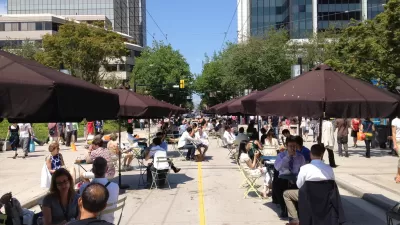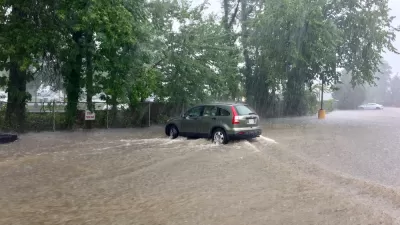The climate change discussion is usually defined by timelines that reach the end of the century, but some cities are preparing for the future of an altered climate by taking a short-term approach.

"As cities debate ways to meet their long-term goals for emissions reductions, a Minnesota town’s new climate plan calls for fast action and quick results over the next five years," reports Frank Jossi.
"The City Council in Red Wing unanimously approved a five-year climate action plan in August and its members anticipate boosting current programs and starting new initiatives within the next few months. The short time horizon contrasts with climate plans in other cities rolled out over a 20-year span," adds Jossi.
The new, short-term approach to climate change is the result of technical consultation provided by the Great Plains Institute. "The city paid Great Plains Institute nearly $15,000 to create the climate action plan, with roughly $3,000 of that paid by a grant. The city would have had to pay Great Plains a higher fee for a plan covering more years," according to Jossi.
The lower coast and shorter timeline is considered a selling point for smaller cities, explains Jossi about the benefits of the Great Plains Initiative. As for what Red Wing got in return for its investment, Jossi says the new climate action plan offers five strategies for reducing emissions from buildings, transportation, and waste.
"If Red Wing follows its climate action plan, greenhouse emissions will fall by 9% during that period, but combined with improved code enforcement on new buildings and a cleaner electricity supply from Xcel Energy, that reduction looks more like 21%," according to Jossi.
A lot more detail on Red Wing's new Climate Action Work Plan (2020 – 2025) are included in the source article, including some of the city's past actions for emissions reductions, and some of the challenges the city expects to encounter over the short timeline of the new plan.
FULL STORY: Minnesota town opts for a short-term approach to its long-term climate goals

Study: Maui’s Plan to Convert Vacation Rentals to Long-Term Housing Could Cause Nearly $1 Billion Economic Loss
The plan would reduce visitor accommodation by 25,% resulting in 1,900 jobs lost.

North Texas Transit Leaders Tout Benefits of TOD for Growing Region
At a summit focused on transit-oriented development, policymakers discussed how North Texas’ expanded light rail system can serve as a tool for economic growth.

Using Old Oil and Gas Wells for Green Energy Storage
Penn State researchers have found that repurposing abandoned oil and gas wells for geothermal-assisted compressed-air energy storage can boost efficiency, reduce environmental risks, and support clean energy and job transitions.

Santa Barbara Could Build Housing on County Land
County supervisors moved forward a proposal to build workforce housing on two county-owned parcels.

San Mateo Formally Opposes Freeway Project
The city council will send a letter to Caltrans urging the agency to reconsider a plan to expand the 101 through the city of San Mateo.

A Bronx Community Fights to Have its Voice Heard
After organizing and giving input for decades, the community around the Kingsbridge Armory might actually see it redeveloped — and they want to continue to have a say in how it goes.
Urban Design for Planners 1: Software Tools
This six-course series explores essential urban design concepts using open source software and equips planners with the tools they need to participate fully in the urban design process.
Planning for Universal Design
Learn the tools for implementing Universal Design in planning regulations.
Ascent Environmental
Borough of Carlisle
Institute for Housing and Urban Development Studies (IHS)
City of Grandview
Harvard GSD Executive Education
Toledo-Lucas County Plan Commissions
Salt Lake City
NYU Wagner Graduate School of Public Service





























